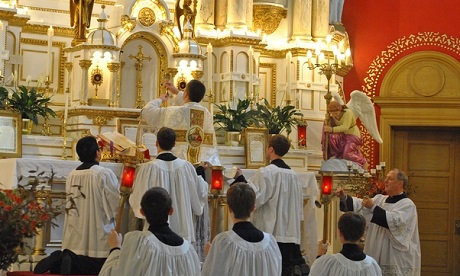Pope Francis has given bishops greater responsibility regarding use of the 1962 Roman Missal.
Apostolic See guidelines say it is the bishop’s exclusive responsibility as the moderator of his diocese’s liturgical life to authorise the 1962 Roman Missal’s use.
In a motu proprio Traditionis Custodes (Guardians of the Tradition) published on Friday, Francis restored limits on the celebration of the Missal in use before the Second Vatican Council for the sake of church unity.
His decision overturns or restricts permissions St. John Paul II and Benedict XVI had given to celebrate the Tridentine-rite Mass.
Francis said the bishop must verify that those attending the pre-Vatican liturgy “do not deny the validity and the legitimacy of the liturgical reform, dictated by Vatican Council II and the Magisterium of the Supreme Pontiffs”.
The motu proprio says:
Masses celebrated according to the 1962 Missal are not to take place in parishes.
Bishops must establish where and when the Mass will be celebrated.
The readings must be proclaimed “in the vernacular language”, using the translations approved by local episcopal conferences.
The bishop will delegate the celebrant.
The bishop must evaluate the Mass to see “effectiveness for spiritual growth” and “to take care not to authorize the establishment of new groups”.
Priests ordained after this motu proprio wanting to celebrate the Tridentine Mass “should submit a formal request to the diocesan Bishop who shall consult the Apostolic See before granting this authorization”.
Those already doing so may ask permission to continue.
In a letter to the world’s bishops accompanying the motu proprio, Francis says concessions granted by his predecessors relating to using the 1962 Roman Missal were “motivated by the desire to foster the healing of the schism with the movement of Mons. Lefebvre” and “the ecclesial intention of restoring the unity of the Church”.
Despite these aims, the concessions were “exploited to widen the gaps, reinforce the divergences and encourage disagreements that injure the church, block her path and expose her to the peril of division,” Francis said.
“Indications about how to proceed in your dioceses are chiefly dictated by two principles,” he continued.
“On the one hand, to provide for the good of those who are rooted in the previous form of celebration and need to return in due time to the Roman Rite promulgated by Saints Paul VI and John Paul II.
“And, on the other hand, to discontinue the erection of new personal parishes tied more to the desire and wishes of individual priests than to the real need of the ‘holy People of God’,”
Francis is “saddened by abuses in the celebration of the liturgy on all sides” and deplores the fact that the “instrumental use of Missale Romanum of 1962 is often characterized by a rejection not only of the liturgical reform, but of the Vatican Council II itself, claiming, with unfounded and unsustainable assertions, that it betrayed the Tradition and the ‘true Church'”.
To doubt the Council “is … in the final analysis, to doubt the Holy Spirit himself who guides the Church,” Francis said.
As well as the Moto Proprio, Francis wrote to all bishops.
Source
